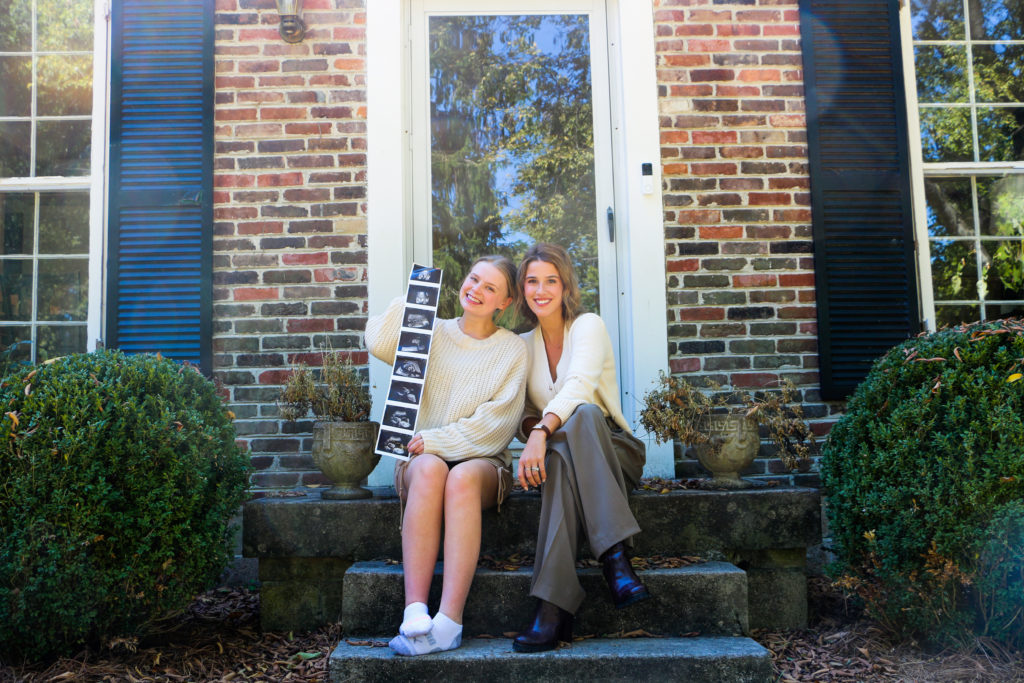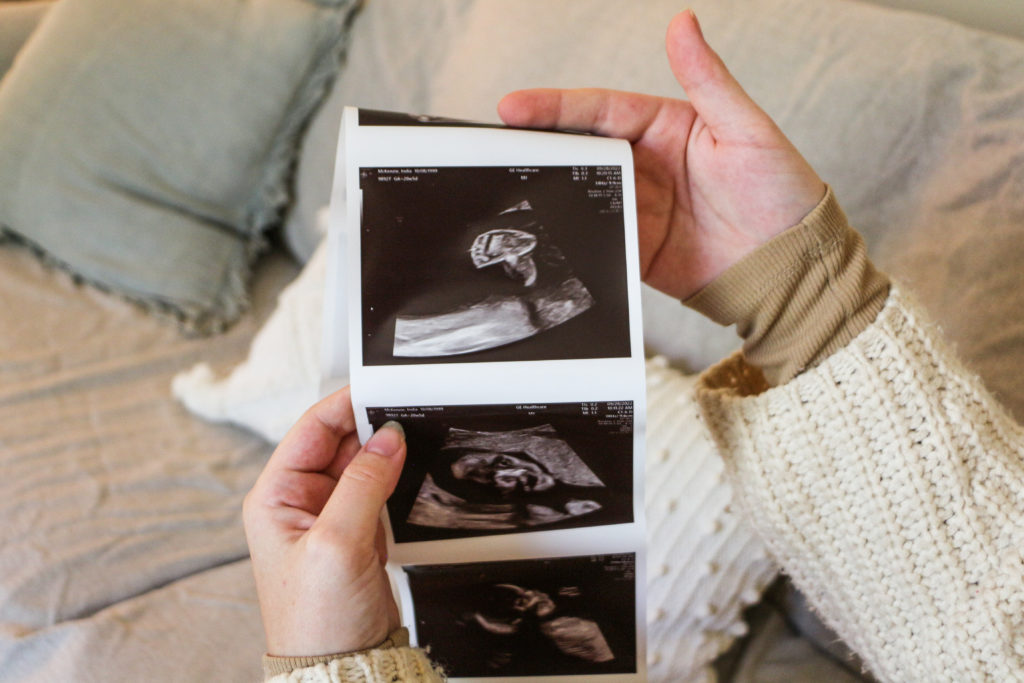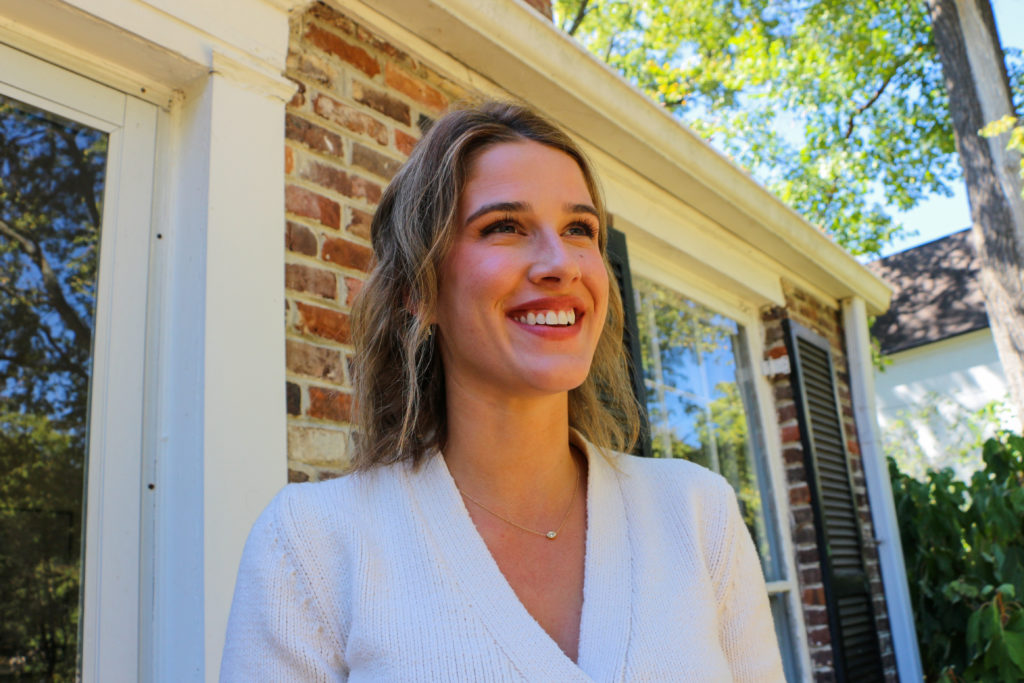
23-year-old India McKenzie proudly holds up her sonogram — the accordion of black and white images unfolding in her hands. She is starting to get excited about this baby, who she plans to name Polly after her grandmother.
“Look at the little foot,” she says, pointing at the sonogram. “That’s my favorite one. So sweet.”
But it’s been an adjustment. The pregnancy was not part of the plan.
“I’ve always wanted to be a mom,” she says, “but never in nursing school — never in the height of, I feel like, my fun in life.”
When she found out, one of her first concerns was what she was going to do about housing.
“Obviously, I can’t live with my best friends who are still having the college lifestyle while I’m trying to prepare to raise a child,” she says.
Moving back home wasn’t really an option either. India grew up with her grandparents in Nashville, and there wasn’t room for her in their house anymore.
And her school, Belmont University, doesn’t offer housing for parenting students. Here in Nashville, there are few on-campus housing options for students who are parents.
So those who find themselves with an unexpected pregnancy are faced not only with costs of school, doctor’s visits and child care, but also Nashville’s sky-high rents.
“Housing in Nashville is crazy right now,” India says. “I’m financially independent for the most part, so just trying to figure out just being a regular college student on top of all the things, the expenses that come along with pregnancy, I just also fell into the idea that it’s just not possible for me to get a place on my own in Nashville.”

India McKenzie holds up her favorite image from her sonogram, showing her baby’s foot.
India’s situation is actually pretty common. Nationwide, over a quarter of undergrad students are raising children. Women disproportionately balance college and parenthood — many without the support of a partner.
And while pregnant students are protected under laws like Title IX, most schools don’t have adequate resources in place for young families — like housing.
India was starting to feel hopeless, and out of options. Her main source of income was 12-hour shifts at a local hospital, which she knew she couldn’t keep up further into the pregnancy.
Then one day, she was scrolling on Facebook and came across an ad for something called Ella’s House.
Encouragement to stay in school
Elise Jenkins opens the door of a three-bedroom brick ranch in Green Hills, not far from Lipscomb University. She gives a tour of the space — a dining room with plenty of space for studying, a den for watching movies, a screened-in porch.
This is Ella’s House, which offers free housing and other resources to pregnant college students.
The house just opened this summer and has space for three students plus a resident director. India is the first resident.
The idea was inspired by Elise’s own experience. She was a senior in college when she found out she was pregnant. It was a crossroads, and she says she wasn’t comfortable with abortion, or adoption.
“And so while my other decision, which was having the baby, seemed really hard and tough, it seemed like the best of three really bad options,” Elise says.
A few years later, she reflected on some of the challenges she faced with her mom, who works in nonprofits. They decided to team up to try to make it easier for pregnant students. They named the nonprofit Ella’s House, after Elise’s daughter.
“She does think it’s her house, which we’ve repeatedly told her it’s not,” Elise says, smiling. “But, you know, it’s tough. It’s tough when you’re 5. Everything is yours.”

Elise Jenkins named Ella’s House after her daughter, who she got pregnant with during her senior year of college.
Potential residents just need to be pregnant, enrolled full time in school, with no other kids. And while Elise is Christian, she says Ella’s House does not have any religious requirements.
“We didn’t want anyone to feel scared or like they were going to be turned away — A. because they either weren’t religious or B. because they made a choice that a religion disagreed with.”
Plus, she says it will be easier to apply for grant money without a religious affiliation.
While the plan for Ella’s House was already in motion before Tennessee passed its restrictive abortion ban, Elise says it was just further proof that there is a need for this type of program — and there will continue to be that need.
Beyond providing free housing, Elise says she hopes students can find community at Ella’s House. She says one of the hardest things was finding people her age who could relate to what she was going through.
“Meeting other young moms was really tough,” Elise says. “I would go to the park and people would say, like, ‘How many days do you nanny?’ And I’d be like, ‘All of them … I’m the parent.'”
She says students like India will need the support. Student-parents are 10 times less likely to graduate college on time than their peers. And without a degree, single parents can face long-term financial consequences.
India says this small brick house may help her avoid that.
“Ella’s House has very much encouraged me to stay in school,” India says. “Whereas, other people are like, ‘You need to start saving money. Like, you’re going to have a child.'”
She says now, she feels like she can do both — for her future, and her daughter’s future too.

